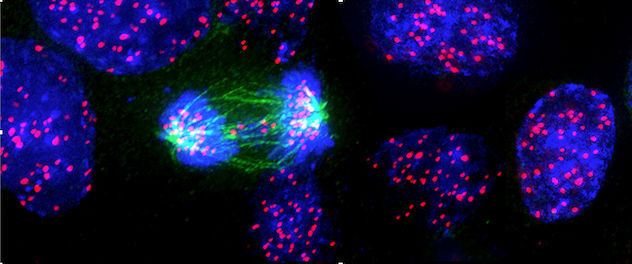 Discovering tumor vulnerabilities
Discovering tumor vulnerabilities
Dr. Rodriguez-Bravo hopes that uncovering mechanisms of genome function and stability in cancer cells may be translated into new therapeutic options.
Overview
The Genome Function, Stability and Nuclear Organization in Cancer Laboratory at Mayo Clinic, led by Dr. Rodriguez-Bravo, studies cell and molecular biology mechanisms of genome organization and stability regulation in cancer. The lab has a special interest in transcription and genome integrity dysregulation in hormone-driven cancers such as prostate cancer.
Dr. Rodriguez-Bravo's research team is investigating the functional role of nuclear pore complex components called nucleoporins, as well as chromosomal instability causes and consequences in cancer. Her primary goal is to uncover fundamental molecular mechanisms to determine future therapeutic opportunities. Using prostate cancer as a model, her group applies a multidisciplinary approach involving genome editing and single-cell high-resolution microscopy, along with biochemical, transcriptomic, epigenetic and computational analysis to decipher novel molecules and mechanisms. Researchers in the lab use different types of experimental models including cells, preclinical patient-derived models and patient tumor tissue samples covering different stages of the disease.
Dr. Rodriguez-Bravo works very closely with colleagues in Mayo Clinic's Department of Urology, sharing the common goal of discovery and innovation to unveil new therapeutic interventions for genitourinary malignancies.
Affiliations
Dr. Rodriguez-Bravo's lab is affiliated with these Mayo Clinic research groups:
About Dr. Rodriguez-Bravo
Veronica Rodriguez-Bravo, Ph.D., is an associate professor of biochemistry and molecular biology at Mayo Clinic School of Graduate Medical Education. She also has a joint appointment in the Department of Urology in Rochester, Minnesota.
Dr. Rodriguez-Bravo is an active member of grant review panels for the National Institutes of Health and National Cancer Institute. She is also a member of different education committees in the American Society for Cell Biology and the Society for Basic Urologic Research, as well as Mayo Clinic's Department of Biochemistry and Molecular Biology. Dr. Rodriguez-Bravo also co-leads the genitourinary cancer interest group at Mayo Clinic Comprehensive Cancer Center.